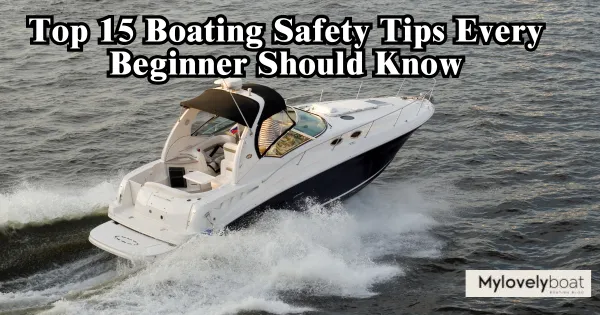Boating is a fun and exciting way to enjoy the water and explore the great outdoors. Navigating the waters safely requires preparation, knowledge, and common sense.
Whether you’re a seasoned sailor or a new boater, understanding and implementing safe boating practices can significantly reduce the risk of accidents and enhance your enjoyment on the water.
Here’s an in-depth look at 15 essential safe boating tips that cater to every boater’s safety and ensure a pleasurable journey across the waves.
1. Take a Boating Safety Course
2. Get a Free Vessel Safety Check
3. Follow a Pre-Departure Checklist
4. Be Weather-Wise
5. Use Common Sense
6. Know the Nautical Rules of the Road
7. Designate an Assistant Skipper
8. Develop a Float Plan
9. Wear a Life Jacket
10. Never Drink and Drive a Boat
11. Be Aware of Carbon Monoxide
12. Don’t Swim in a Marina
13. Stay Clear of the Engine
14. Have a Basic Understanding of Boat Maintenance
15. maintain a Safe Speed
Top 15 Boating Safety Tips Every New Boater
Learn the top 15 boating safety tips to ensure your time on the water is enjoyable and secure. From wearing life jackets to weather awareness, learn how to sail safely today!
Take a Boating Safety Course:
Participating in a boating safety course is essential for beginners to learn navigational rules, emergency procedures, and boating laws. This knowledge can prevent accidents on the water and ensure a safe, enjoyable experience. Many courses are offered online, gaining valuable insights and certifications that reduce insurance costs conveniently.
Get a Free Vessel Safety Check:
The U.S. Coast Guard Auxiliary and the U.S. Power Squadrons offer complimentary boat examinations to verify the presence and condition of specific safety equipment required by state and federal regulations. These checks can help prevent equipment failures and fines, ensure your vessel meets all safety standards, and provide peace of mind during your boating adventures.
Follow a Pre-Departure Checklist:
Implementing a pre-departure checklist is crucial for safe boating. This list should include checking the weather, ensuring all necessary safety gear is aboard (like life jackets, fire extinguishers, and first aid kits), and informing someone about your itinerary. This systematic approach can help avoid overlooked errors and ensure a safer outing.
Be Weather-Wise:
Always check the local weather conditions before departure. Sudden weather changes can be hazardous, especially to inexperienced boaters. If you notice darkening clouds, changing winds, or sudden temperature drops, it’s wise to get off the water. Understanding and respecting weather signs can be a life-saving skill in boating.
Use Common Sense:
Common sense is a crucial aspect of boating safety. This includes continually operating at a safe speed, staying alert, and being respectful of buoys and other navigational aids. These simple practices help prevent accidents and ensure the safety of everyone on board and other water users. Avoid alcohol while operating a boat, as it impairs judgment and increases the likelihood of accidents.
Know the Nautical Rules of the Road:
Learning and understanding the nautical rules of the road is akin to learning the rules for driving a car. These rules govern how vessels interact with each other to prevent collisions. Key rules include knowing which vessel has the right of way, how to overtake other boats safely, and understanding the light and sound signals boats use to communicate.
Designate an Assistant Skipper:
Always have an assistant skipper who knows your boat’s handling, operations, and general boating safety. This ensures that someone else can safely navigate and operate the boat if the primary skipper cannot. The presence of a knowledgeable assistant skipper can be especially critical in emergencies, ensuring that the voyage can continue safely regardless of circumstances.
Develop a Float Plan:
Inform a family member or staff at your local marina about your trip itinerary, often called a float plan. This plan includes details like the names and numbers of all passengers, trip itinerary, types of communication, and signal equipment on board. In the event of an emergency, responders will have a better understanding of where to look, significantly increasing the chances of timely and successful rescue operations.
Wear a Life Jacket:
Statistics show that the majority of drowning victims from boat accidents were found not wearing a life jacket. It is crucial for everyone aboard to wear an appropriately sized and correctly fastened life jacket at all times. Modern life jackets are comfortable and stylish and do not impede movement, ensuring safety without sacrificing enjoyment.
Never Drink and Drive a Boat:
Operating a boat under the influence of alcohol or drugs is not only illegal, but it also significantly increases the risk of accidents on the water. Alcohol impairs judgment, balance, and coordination, essential for safe boating. Make the responsible choice to stay sober when piloting or operating a boat to ensure everyone’s safety.
Be Aware of Carbon Monoxide:
Boats, especially those with cabins, can accumulate dangerous levels of carbon monoxide (CO), a colourless, odourless gas that can be fatal. Ensure your boat has a functioning CO detector, educate yourself and others about the symptoms of CO poisoning, and maintain proper ventilation at all times. Regularly inspect exhaust and ventilation systems to prevent CO buildup.
Don’t Swim in a Marina:
Swimming in marinas is extremely risky due to the potential presence of electrical current in the water, which can cause electric shock drowning. Additionally, boat traffic and hidden underwater hazards increase the risk of injury. Always choose designated swimming areas away from boats and marinas to keep safe while enjoying the water.
Stay Clear of the Engine:
Keeping a safe distance from the boat’s engine is crucial, especially when the engine is running. The engine area can become exceedingly hot and presents a risk of burns. Additionally, moving parts can pose a danger of injury. Ensure that personal items and body parts remain clear to prevent accidents. Familiarize yourself with emergency engine shut-off procedures to enhance safety on the water.
Have a Basic Understanding of Boat Maintenance:
Any boater must have a fundamental knowledge of boat maintenance. This includes understanding how to perform pre-and post-trip inspections, recognizing signs of wear or damage, and knowing basic engine maintenance. Regular checks can prevent breakdowns and extend the life of your vessel. Being proactive about maintenance can also ensure that your boat remains safe and seaworthy for every trip.
Maintain a Safe Speed:
Maintaining a safe speed is vital for ensuring the safety of everyone on board and other waterway users. Speed should be adjusted for the water conditions, visibility, and boat traffic. High speeds make reacting to obstacles or changes in conditions more challenging. A responsible boater knows when to slow down to avoid accidents or collisions, ensuring their pleasure doesn’t threaten others.

I am a freelance writer passionate about watersports and the great outdoors. I have many years of experience in the marine industry, and I enjoy sharing my knowledge and expertise with others so that they can get the most out of their boating experiences. I like fishing, kayaking, and exploring new destinations by boat whenever I have time. Contact Us: Linkedin







